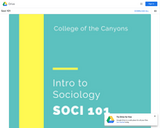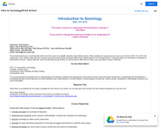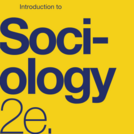
Define deviance, and explain the nature of deviant behaviorDifferentiate between methods of social control
- Subject:
- Social Science
- Sociology
- Material Type:
- Module
- Author:
- James Farmer
- Date Added:
- 08/26/2018

Define deviance, and explain the nature of deviant behaviorDifferentiate between methods of social control

This course explores how identities, whether of individuals or groups, are produced, maintained, and transformed. Students will be introduced to various theoretical perspectives that deal with identity formation, including constructions of “the normal.” We will explore the utility of these perspectives for understanding identity components such as gender, sexual orientation, race, ethnicity, religion, language, social class, and bodily difference. By semester’s end students will understand better how an individual can be at once cause and consequence of society, a unique agent of social action as well as a social product.

This course is designed to introduce you to a range of basic sociological principles so that you can develop your own sociological imagination. You will learn about the origins of sociology as a discipline and be introduced to major sociological theories and methods of research. You will also explore such topics as sex and gender, deviance, and racism.

Intro to Sociology / SOCI 101
Examines small group interactions and cultural patterns of American and other societies using the conceptual, theoretical, and methodological principles and applications to explain how values, roles, norms, social interaction, and social inequality as well as other concepts influence individuals, groups, and society.

This course provides the student with an understanding of the theories, methods, and approaches to the study of human social and group interactions. It emphasizes the development of sociological thought and the influences of social institutions and cultural factors on human behavior. Among subjects covered are: culture, groups, socialization, methodology, deviance and social inequalities.

Introduction to Sociology 2e adheres to the scope and sequence of a typical, one-semester introductory sociology course. It offers comprehensive coverage of core concepts, foundational scholars, and emerging theories, which are supported by a wealth of engaging learning materials. The textbook presents detailed section reviews with rich questions, discussions that help students apply their knowledge, and features that draw learners into the discipline in meaningful ways. The second edition retains the book’s conceptual organization, aligning to most courses, and has been significantly updated to reflect the latest research and provide examples most relevant to today’s students. In order to help instructors transition to the revised version, the 2e changes are described within the preface.


Define deviance, and explain the nature of deviant behaviorDifferentiate between methods of social control

Textbook, slides, and class activities related to groups and formal organizations, and deviance and social control. Primary text: OpenStax Introduction to Sociology 2e
![New AS and Advanced Level Sociology Specifications, AS and A2Govt and Politics [Ideologies]](https://img.oercommons.org/160x134/oercommons/media/screenshots/9c8d2b79a18b31353b7ba9dfc789aff925dec3e78b217c56cd27505d7f006db2.png)
UK site geared to Advanced Level Sociology [for 16-18 year olds] although some of the more detailed documents may be suitable for beginning undergraduates. Sociology topics covered are: Introduction to Sociology; Families and Households; Sociology of Education; Social Differentiation and Stratification and there are also links to orther sites for materials on Crime and Deviance and Theories and Methiods.

When a norm is violated, it's referred to as deviance. And though the word, deviance, seems negative, it's not. It simply means that an individual's behaving differently from what society feels is normal behavior.

Unit 6 – Deviance and Social ControlRead: Chapter 7 pages 136 – 138Definition of Deviance. - The effects of deviance on society: Promotes social solidarity by distinguishing “us” from “them;” Helps people adjust to change and ease the shock; Provides a way in which some individuals and groups introduce their agenda to the rest of society. Are there any universal laws? It seems that in every society murder is a crime-- (But there are a very wide set of circumstances under which killing is permitted. What one society considers to be murder, another will consider a justifiable homicide example, in one society in the middle east a woman can be beheaded for adultery. What American court would levy this sentence?!)Identify methods of social control - Conformity vs. ObedienceSociological Theoretical Perspectives of Deviance: Functionalist Perspective, Conflict Perspective and Interactionist Perspective of DevianceSociology: Understanding and Changing the Social World, Read: Page 199 - 200 Table 7.1 “Theory Snapshot: Summary of Sociological Explanations of Deviance and Crime” Specific Theoretical Perspectives of Deviance: Durkheim’s Function of Deviance, Robert Merton’s Anomie Theory of Deviance, Subculture Theory of Deviance, Social Control Theory, Feminist Perspective, Sutherland’s Differential Association Theory, Labeling TheorySociology: Understanding and Changing the Social World, Read: Pages 200-210

YouTube Channel is @SociologyVibes and includes 50 OER sociology explainer videos that are also categorized by playlists (similar to common Introduction to Sociology chapters). More videos will be uploaded regularly. Each YouTube video descriptor includes three reflection questions. Videos can supplement lectures, assignments, and student success resources. All videos have a CC-BY-NC license.

This lesson deals with the nature of deviance through documentaries done through the PBS series Frontline or the documentary series Real Stories.Students will need to review the nature of deviance and crime, apply key concepts and terms that deal with deviance and crime, and apply those concepts to a film clip that is school appropriate and exemplifies those concepts.Students will be the faciliators of a film study of that clip and will lead discussions about the aspects of the film clip and analysis.